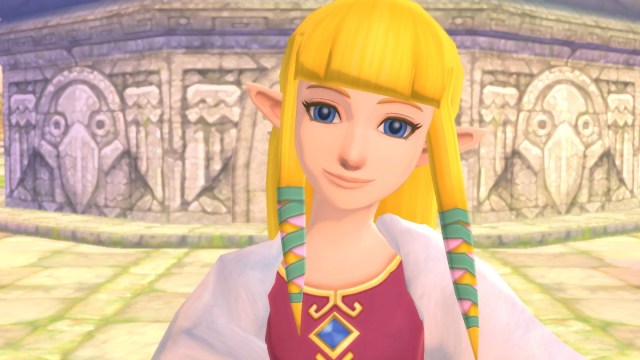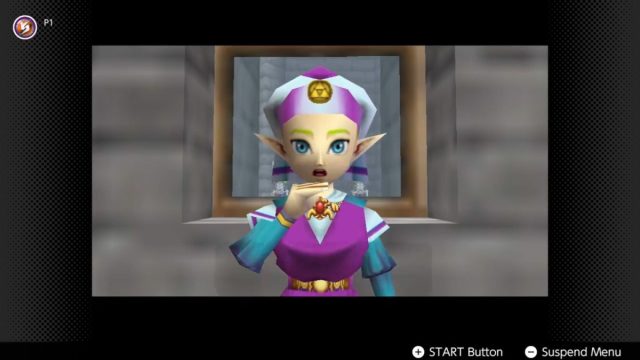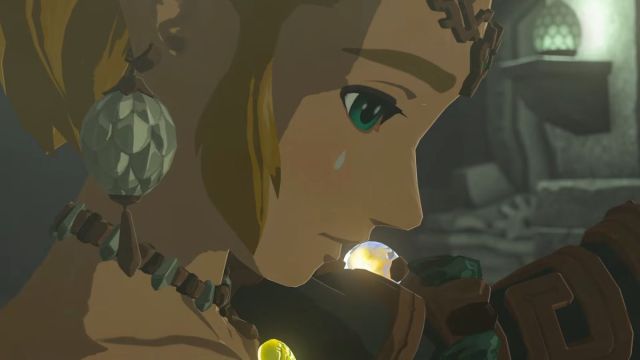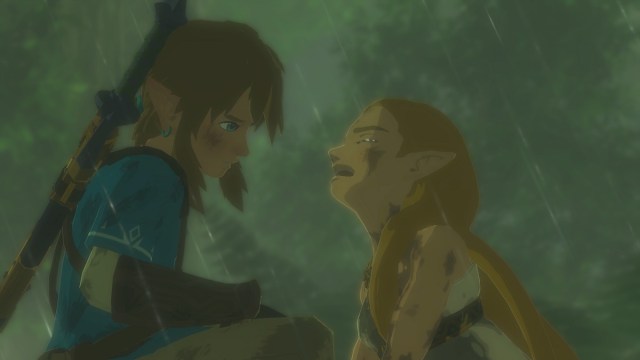The titular princess deserves better in The Legend of Zelda
Drop the monarchy
As the prophecy has foretold, evil will rise, time and time again, and a hero will show up to make it stop. Their job would be a lot easier if there wasn’t also a third person in the prophecy who, time and time again, makes everything worse.
Princess Zelda is one of the most vexing supporting characters in video game history. Being type-cast is bad enough, but when the narrative actually does have her in a more prominent role, it’s almost always her duty to screw up and make the problem bigger. She’s there simply to give Link more problems to solve. The Legend of Zelda may have her name in the title, but the series would be a lot better off completely rethinking the character or simply dropping her completely.
While The Legend of Zelda: Majora’s Mask is one of my favorite stories ever told in a video game, I generally don’t hold the series in high regard in terms of storytelling. Don’t get me wrong, it’s one of my favorite properties in gaming, having been the initial spark for my passion for the hobby back with the NES original. However, that’s largely due to a myriad of other reasons and not because it tells good narratives. It rarely does, and that’s partly the fault of Princess Zelda.
From here on out, I’m going to be talking about the plot of various titles in the series in vague terms. Consider this your spoiler warning.

Spoiler Warning
I’m not going to victim blame here. Getting kidnapped seems to be the most common pastime of princesses, right alongside dating and animal husbandry. I’m not going to blame her for starting her career by being kidnapped. Nor do I have a problem with her being asleep for the entire next title. It gets a little absurd in A Link to the Past when she’s kidnapped, saved, then quickly kidnapped again, which might be why she was omitted from The Legend of Zelda: Link’s Awakening.
But when we get to 1998’s The Legend of Zelda: Ocarina of Time, Princess Zelda is shown as the key factor in the Kingdom of Hyrule’s woes. She enlists a child to steal three sacred artifacts, who then opens the door so the main bad guy gets unlimited power. She says that dreams made her do it, which was exactly my excuse when I was found next to the charred remains of Old Man O’malley’s barn with a pack of matches. The only reason the world wasn’t doomed for certain is because of Link and a clause in the Triforce’s contract.
Since then, Ganon has been running rampant, and she hasn’t really done much to stop that. Everything falls on Link, which is his job. I don’t even know why she’s even part of the prophecy. The best she really does to help is hold the bad guy still for free shots. She’s sort of the conduit for the wisdom of the Gods, even though the Gods don’t really seem that helpful either.
For all we know, it’s a case of the telephone game. The Gods tell her one thing, and she passes the absolutely wrong information along to the eternally suffering hero. Maybe that’s why, in Breath of the Wild, the Gods are done talking to Princess Zelda. Why would they bother? She only takes the wrong meaning and makes things worse. She can do that on her own. And she did.

A touch-up
The Legend of Zelda is a series with a tonne of great female characters, and Zelda herself isn’t one of them. Wind Waker was perhaps the first time they attempted to give her a more adventuresome, less damsel-y side, but she only stays that way for about half the game. The moment she puts on her traditional dress (and make-up, weirdly), she turns into a personality-devoid damsel.
In Breath of the Wild, she spends the whole backstory fucking around and subsequently finding out. Bizarrely, this is Zelda at sort of her best, as she at least has some humanity. She’s realistically flawed, which is more depth than she’s been previously provided. It just seems like a bizarre course correction by changing from a hapless victim to the ultimate screw-up and then still reverting her back into the exact same damsel she was the whole game.
Skyward Sword perhaps had her at her most capable, but even there, she winds up just acting like a key. And then things still don’t go according to plan, and the very thing she’s trying to prevent from happening occurs anyway. She’s dependable in that regard, at the very least.

The cyclical symptom
If we’re being honest, the major issue with the narrative of The Legend of Zelda isn’t Princess Zelda herself, but she’s a visible symptom of the issue. She’s the bubons of the black death. The real issue with the series is its steadfast adherence to cyclical storytelling, which wasn’t even established until maybe Wind Waker at the earliest.
I hate prophecy as a storytelling mechanic unless it’s being subverted. Telling people what is supposed to happen is predictable by design, and I don’t know why anyone would opt for that. However, in The Legend of Zelda, we’re stuck with the three factors of Courage, Power, and Wisdom, and it seems that Wisdom is constantly calling in sick.
But even within the confines of those restrictions, Princess Zelda doesn’t need to always be such a screw-up. She could be framed as the hero or even the villain. Wisdom isn’t always wielded for the better of others. Maybe there could be a Zelda title where she manipulates Link and fools Ganondorf for her own gain. Having the Wisdom part of the Triforce always needing to be saved kind of just makes it seem like the series is calling the smart person a nerd.

Where does Princess Zelda go from here?
There are some exceptions to this. The Legend of Zelda: Spirit Tracks allowed her to be a more active participant in the story, as much of the game has her adventuring alongside Link. Mostly. Her body is taken from her, but her spirit is able to participate in her own rescue, and she manages to avoid making things worse. Though interestingly, Ganondorf isn’t present, meaning the cyclical prophecy angle isn’t involved in the narrative.
There are also the more notorious examples on the CDi where she took the lead role. Zelda: The Wand of Gamelon and Zelda’s Adventure were both developed without Nintendo’s involvement. While they’re both unique in the way they swap Princess Zelda to be the primary protagonist, they’re both victims of being developed for a platform that wasn’t very well suited to games. They’re hardly a good metric to judge the potential of a hero Zelda.
I’d rather just have the series move away from including her altogether. Having her here means that the games always have some sort of connection to the Royal Family of Hyrule and the kingdom itself. I’ve always sort of wanted to see what’s out beyond.
It could be argued that it’s hard to call the series “The Legend of Zelda” when she’s not included, but it’s always been a bit of a misnomer. The narrative often puts the emphasis on the three central characters and not just her, with Link being the primary focus. We’ve also had titles like Majora’s Mask and Link’s Awakening where she plays little or no role at all.
I also know that moving away from the prophecy angle would likely meet resistance because that’s also right there in the title. And yet, again, not every Zelda game has a prophecy, once again showing how vestigial it is. None of this is required in the same way that there’s nothing final about Final Fantasy. Old standards are being clung to, even when they’re detrimental.

Fine, just fine
As I said, I love The Legend of Zelda, but I’ve had my frustrations with the series. My most monumental gripe is with its constant fumbling of narratives. The fact that there’s a published timeline trying to tie all the games together causes the bile to rise in the back of my throat every time I think of it.
There’s a lot of possible freedom in the game’s fantasy universe that hasn’t been tapped, could still be tapped within the restrictions the series’ various storytellers have erected, but could be better explored if they dropped them entirely. Majora’s Mask was far and away the best story the series ever had, and it didn’t even take place in Hyrule. Link’s Awakening, while being simplistic in a way that was common for the time period and platform it came out on, still had more emotional depth and mystery than a lot of the more complex attempts.
At the same time, if the series never gets any better at telling stories, that’s fine, I guess. I play Zelda games because they make glass bottles seem like the most useful item in the universe. I don’t play them to have my thoughts provoked. For that matter, I’m even of the mindset that Breath of the Wild was the best the series has been since Wind Waker, but storytelling isn’t part of it.
I just want the series to move closer to whatever might be perceived as perfection, and to start with, they should drop the Monarchy.
For all the latest Gaming News Click Here
For the latest news and updates, follow us on Google News.

